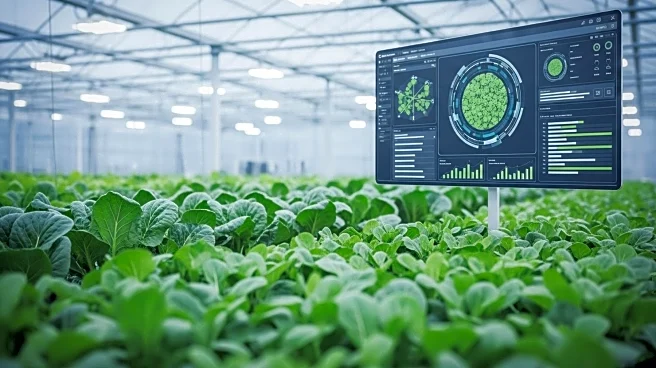What is the story about?
What's Happening?
Samuel B. Fernandes, an assistant professor at the Arkansas Agricultural Experiment Station, has been awarded nearly $450,000 by the Foundation for Food & Agriculture Research. This grant is part of the New Innovator in Food & Agriculture Research Award, aimed at supporting early-career scientists. Fernandes is developing advanced genomic prediction models that integrate crop growth data, which will assist plant breeders in predicting crop performance under changing weather conditions. This research is crucial as severe weather events pose threats to harvests and global food security. The project involves collaboration with Elvis Elli, an assistant professor of crop physiology, to provide crop growth models. Both scientists are part of the University of Arkansas System Division of Agriculture’s Crop, Soil and Environmental Sciences Department.
Why It's Important?
The grant awarded to Fernandes is significant as it supports research that addresses the challenges posed by climate change to agriculture. By developing models that predict crop performance under various weather conditions, the research aims to enhance the resilience of crops to environmental stresses. This could lead to more reliable food production and security, benefiting farmers and consumers alike. The ability to accurately predict and select crop traits suited to different climates can improve agricultural efficiency and sustainability, potentially reducing the impact of adverse weather on food supply chains.
What's Next?
Fernandes and his team will continue their research, focusing on genotype-by-environment interactions to identify crop varieties that are resilient across multiple environments. The New Innovator Award allows Fernandes to explore innovative solutions without the need for matching funds, providing him the freedom to pursue bold research avenues. The collaboration between Fernandes and Elli is expected to yield advancements in crop selection tools, which could be implemented in agricultural practices to improve crop resilience and productivity.
Beyond the Headlines
The research conducted by Fernandes and his team could have long-term implications for agricultural practices and food security. By improving the accuracy of genomic prediction models, the research may contribute to the development of crops that are better suited to withstand climate change. This could lead to shifts in agricultural policy and practices, emphasizing the importance of climate-smart agriculture. Additionally, the research highlights the role of early-career scientists in driving innovation and addressing global challenges.
















